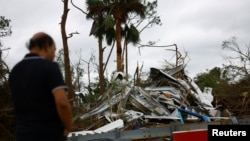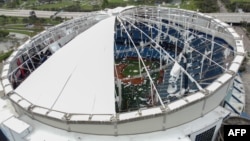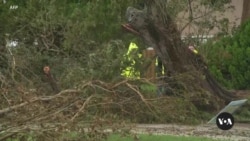Florida residents are assessing the destruction caused by Hurricane Milton, which triggered heavy rains and flooding, spawned tornadoes and caused widespread power outages as it came ashore.
Milton, now a powerful post-tropical cyclone, brought damaging winds to central and northern Florida on Thursday, destroying homes and leaving at least five people dead and 3 million without electricity before moving over the Atlantic Ocean. Utility companies warned that outages could last for an extended period of time.
President Joe Biden, in a televised address Thursday about the government's response, said, "This is going to be a long haul for total rebuilding.
"It's going to take several billion dollars. ... We will do everything in our power to help you recover," the president said.
The storm made landfall late Wednesday near Siesta Key in Sarasota County as a Category 3 hurricane with maximum sustained winds of up to 205 kilometers per hour.
It spent the night plowing across the state, prompting authorities to issue flash flood emergencies, before the center of the storm emerged in the Atlantic Ocean a few hours before sunrise Thursday.
St. Petersburg, a city on Florida's west coast near the landfall site, recorded 41 centimeters of rain, eight times the city's monthly average for October.
The hurricane also brought a storm surge – inundation of water from the coast to inland areas – to the cities of Tampa, St. Petersburg, Sarasota and Fort Myers.
Tampa Mayor Jane Castor said early Thursday that Tampa's storm surge was not as large as forecast.
"One of the blessings for us is that we did not see that predicted storm surge. That saved a lot," Castor said, adding that the extent of Milton's damage would not be known until crews could assess the destruction.
"We will better understand the extent of the damage as the day progresses," Florida Governor Ron DeSantis told reporters Thursday. "The storm was significant, but thankfully, this was not the worst-case scenario."
DeSantis said his office is now deciding where distribution sites will be located for Florida residents for resources, including "water, food, tarps, things of that nature."
The governor also said he is hopeful that stores and gas stations will "reopen fairly quickly."
The National Weather Service in Miami posted photographs of tornadoes on the social media platform X and said that Florida was experiencing "a very favorable environment for quick-moving and dangerous tornadoes."
The agency issued more than 50 tornado warnings by Wednesday afternoon.
Emergency management officials said at least 125 homes were destroyed, many of them mobile homes.
Milton's arrival in Florida comes just two weeks after Hurricane Helene hit the state.
Some information for this report came from Reuters, The Associated Press and Agence France-Presse.








